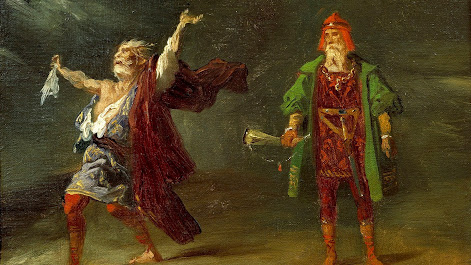By: Lauren AlRabadi
In Shakespeare’s King Lear, women are portrayed as more powerful and merciless than men, where the royal daughters hold a more demanding rule than their own father who is king. This is an unusual categorization of the female sex as males commonly hold these two characteristics in any given literary work to one extent or another. In this play, female characters are more primal and masculine than their male counterparts, which almost villainizes the former and sparks automatic empathy in the patriarchal latter.
For instance, when the traitor Gloucester is caught by Regan and her husband, he is threatened with the brutal plucking of his eyes. Regan does not believe her spouse Cornwall can handle fighting the servant defending Gloucester, and violently seizes control of the situation. “Give me thy sword. A peasant stand up thus!” she demands, then “[takes] a sword, and runs at him behind” (Shakespeare 3.7.77-78).
Furthermore, Goneril is very authoritative over her submissive husband and takes control over their relationship in a traditionally masculine way. She states domineeringly, “I must change arms at home, and give the distaff into my husband’s hands” (4.2.17-18), as if she does not expect nor will accept any protests from her spouse. In a manner unfeminine towards herself and emasculating towards her husband, she declares that she’s taking heed of leading their household and will start wearing the pants in their marriage, while he becomes the acquiescent housewife.
With their transvestite desire for the exchange of traditional societal and marital roles, these women defy timeless gender norms and exhibit completely unorthodox yet powerful strength as women in Shakespearean times.
















